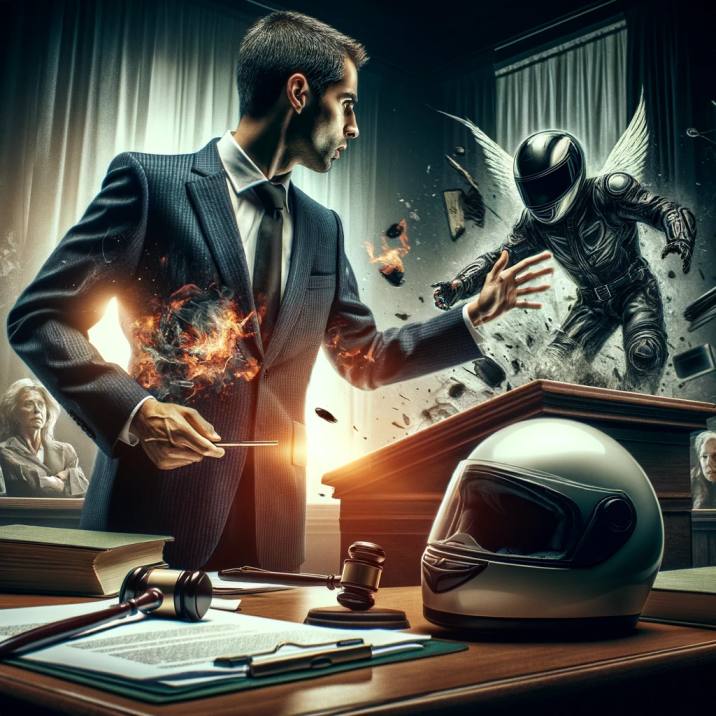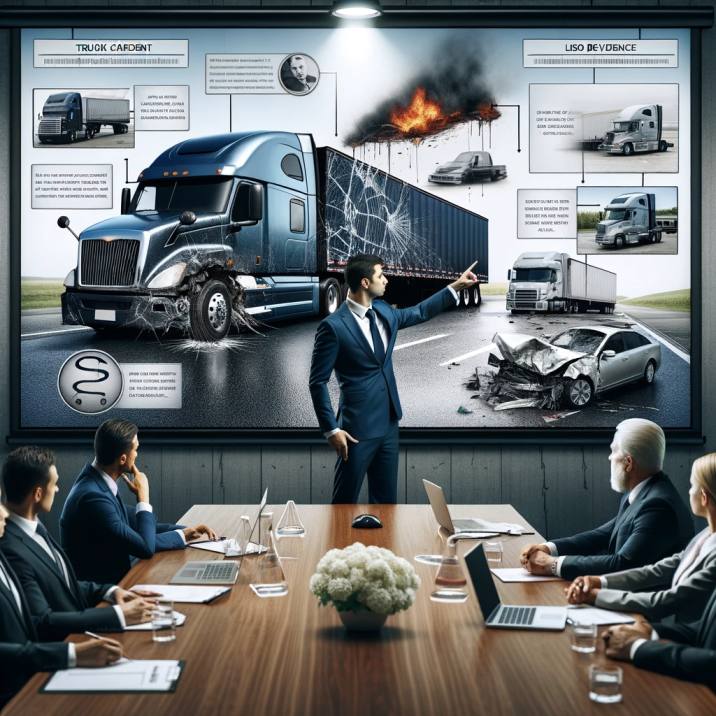In this article we have discussed Role of Lawyer for 18 Wheeler Accident
Introduction to Legal Assistance for 18-Wheeler Accidents
In the intricate tapestry of Indian roadways, 18-wheeler trucks are pivotal in the transportation of goods across vast distances. However, the sheer size and weight of these vehicles can lead to catastrophic accidents, causing severe injuries or fatalities. In such distressing times, securing a knowledgeable lawyer becomes crucial. This article delves into the indispensable role lawyers play in navigating the complexities of 18-wheeler accident cases within the framework of Indian law.
The Essential Role of Lawyers in 18-Wheeler Accident Cases Under Indian Law
The Unique Challenges of 18-Wheeler Accidents
18-wheeler accidents are not just accidents on a larger scale; they introduce a myriad of legal complexities due to the potential for severe damages, involvement of commercial entities, and intricate regulations governing commercial transportation. The magnitude of these accidents necessitates an in-depth understanding of both national and state-specific traffic laws, insurance policies, and the rights of the injured.
Legal Framework Governing 18-Wheeler Accidents in India
In India, the Motor Vehicles Act, 1988, and the rules framed thereunder are the cornerstone for addressing road accidents, including those involving 18-wheelers. This act, along with amendments and related legislation, outlines the responsibilities of drivers, vehicle standards, and the process for compensation claims.
The Role of Lawyers in 18-Wheeler Accident Cases
Legal Representation and Advocacy
A lawyer specializing in 18-wheeler accidents serves as a navigator through the legal process, ensuring that victims’ rights are protected. They advocate on behalf of their clients, aiming to secure fair compensation for injuries, damages, and any losses incurred. This involves gathering evidence, consulting with experts, and negotiating with insurance companies and opposing counsel.
Navigating the Claims Process
Filing a claim for compensation in 18-wheeler accident cases involves a series of steps that require meticulous attention to detail and adherence to deadlines. Lawyers play a pivotal role in preparing and submitting all necessary documentation, including accident reports, medical records, and evidence of damages.
Legal Expertise and Strategic Litigation
Lawyers bring their expertise in the laws and regulations specific to commercial vehicles and their operation on Indian roads. They develop strategies tailored to each case, whether it involves negotiating settlements or representing clients in court. Their knowledge of procedural norms and legal precedents can significantly influence the outcome of a case.
The Impact of Legal Assistance on Compensation
Maximizing Compensation Claims
A lawyer with experience in 18-wheeler accidents can effectively assess the full extent of damages and calculate the appropriate compensation. This includes not only immediate medical expenses and property damage but also long-term impacts such as loss of earnings, emotional distress, and rehabilitation costs.
Overcoming Legal Challenges
The complexity of cases involving 18-wheelers often leads to disputes over liability and compensation amounts. Skilled lawyers are adept at overcoming these challenges, ensuring that their clients’ claims are robustly supported and effectively presented.
Conclusion: The Critical Role of Legal Assistance
The aftermath of an 18-wheeler accident can be overwhelming for the victims and their families. In navigating the intricate landscape of Indian law, the role of a lawyer is invaluable. Legal professionals not only provide the necessary legal representation and guidance but also offer emotional support during such challenging times. By securing the right legal assistance, victims can ensure that their rights are protected, and fair compensation is obtained, paving the way for a smoother recovery process.
You can also read :- Role of Expert Accident laywer
FAQs on The Role of Lawyers for 18-Wheeler Accidents Under Indian Law
1. What is an 18-wheeler accident?
An 18-wheeler accident involves large trucks with a total of 18 wheels, often resulting in significant damages and injuries due to their size and weight.
2. Why do I need a lawyer for an 18-wheeler accident case?
A lawyer can navigate the complex legal and procedural requirements, ensuring your rights are protected and maximizing your compensation.
3. What laws govern 18-wheeler accidents in India?
The Motor Vehicles Act, 1988, along with amendments and related legislation, governs 18-wheeler accidents in India.
4. How is fault determined in an 18-wheeler accident?
Fault is determined through evidence, including accident reports, eyewitness accounts, and expert testimony.
5. Can I claim compensation if I’m partly at fault?
Yes, under Indian law, you can still claim compensation under the principle of ‘comparative negligence,’ though it may be reduced according to your share of fault.
6. What types of compensation can I claim?
Compensation can include medical expenses, lost wages, property damage, and pain and suffering.
7. How long do I have to file a claim after an 18-wheeler accident?
The limitation period is generally 3 years from the date of the accident, but it’s advisable to consult a lawyer immediately.
8. Do I need to go to court to get compensation?
Not always. Many cases are settled out of court through negotiations handled by your lawyer.
9. What if the truck driver was not properly licensed?
This can significantly strengthen your case, as it demonstrates negligence on the part of the driver or the trucking company.
10. How do I prove my injuries are from the accident?
Medical records, doctor’s statements, and expert testimony are crucial in proving your injuries are a direct result of the accident.
11. What if the trucking company is based outside India?
You can still file a claim against them in India if the accident occurred within Indian jurisdiction.
12. Can I claim for emotional distress?
Yes, compensation for emotional distress is recognized under Indian law.
13. What should I do immediately after an 18-wheeler accident?
Ensure everyone’s safety, call emergency services, report the accident to the police, and document the scene.
14. Who can be held liable in an 18-wheeler accident?
The truck driver, trucking company, vehicle manufacturer, or other negligent parties can be held liable.
15. How is compensation calculated in these cases?
Compensation is calculated based on the extent of injuries, financial losses, and the impact on the victim’s life.
16. What if the accident resulted in a fatality?
The legal heirs of the deceased can file a claim for wrongful death compensation.
17. Can a lawyer help if the insurance company denies my claim?
Yes, a lawyer can challenge the denial and negotiate or litigate for a fair settlement.
18. Are truck drivers subject to specific regulations?
Yes, truck drivers in India must adhere to regulations regarding licensing, vehicle maintenance, and load limits.
19. What is the role of the insurance company in these accidents?
The insurance company of the liable party typically covers the compensation for damages and injuries.
20. How long does it take to resolve an 18-wheeler accident claim?
The duration varies depending on the case complexity, but a lawyer can expedite the process.
21. Can I claim for future medical expenses?
Yes, if it’s proven that future medical care is necessary due to the accident.
22. What if the truck was carrying hazardous materials?
This can complicate the case and potentially increase the compensation due to the increased risk of harm.
23. Should I accept the insurance company’s initial offer?
Consult with your lawyer first, as initial offers may not fully cover your losses.
24. How can I find the right lawyer for my case?
Look for a lawyer with experience in 18-wheeler accident cases and a strong track record of success.
25. What documentation will my lawyer need?
Your lawyer will need accident reports, medical records, proof of lost wages, and any other evidence related to the accident.
26. Can I sue the government if poor road conditions caused the accident?
Yes, if it can be proven that negligence in maintaining the road contributed to the accident.
27. How does contributory negligence affect my case?
It can reduce the amount of compensation if you are found partly responsible for the accident.
28. What are punitive damages?
Punitive damages are awarded in cases of gross negligence to punish the wrongdoer, though they are rare.
29. Can I negotiate my compensation directly with the trucking company?
It’s advisable to have a lawyer handle negotiations to ensure your interests are fully represented.
30. What if I have more questions about my case?
Consulting with a specialized lawyer is the best way to get answers specific to your situation and legal advice tailored to your case.














